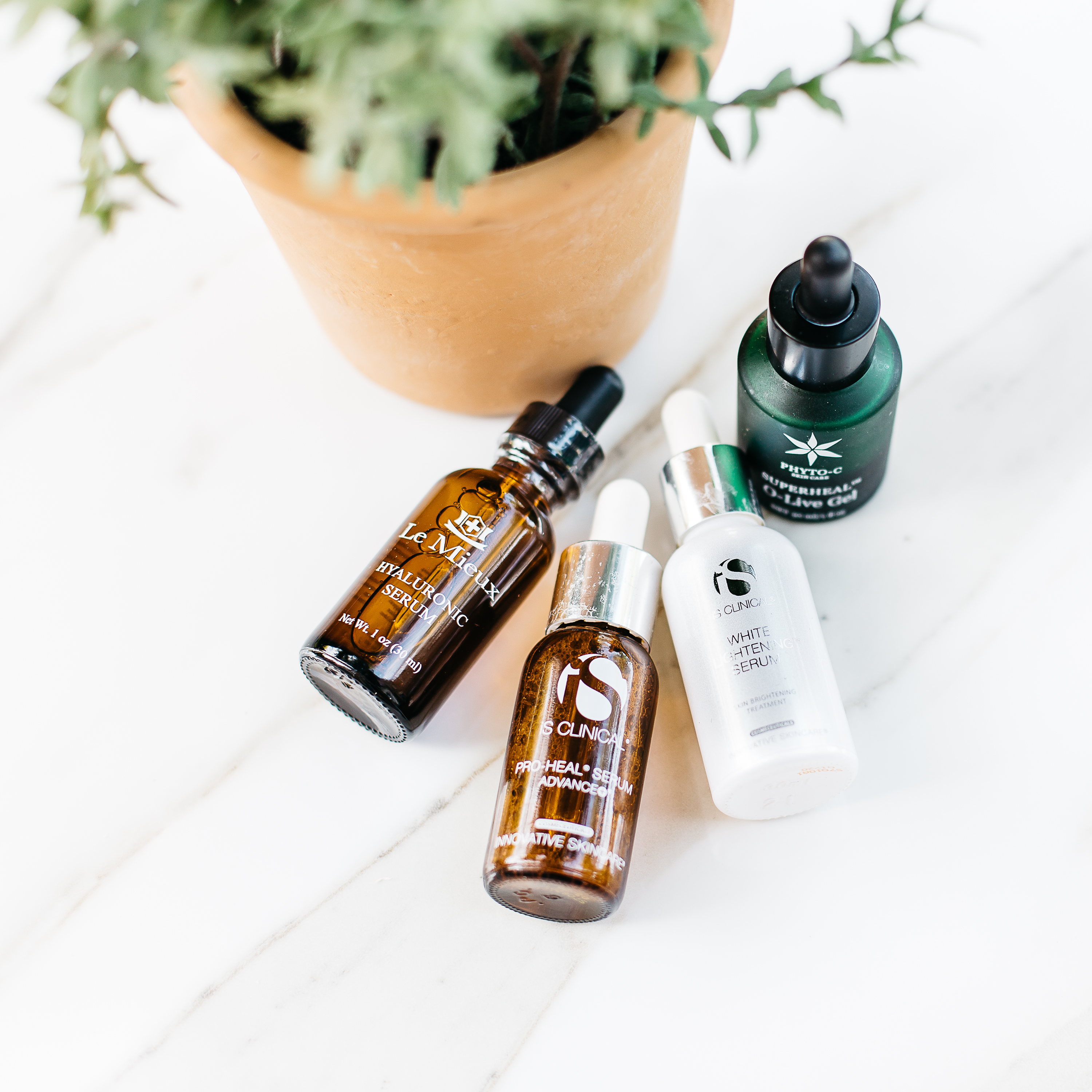Developing a skin care strategy as we age is so important. I’ve had a few girlfriends confess they regret not taking the time to develop a skin care routine when they were younger and now they really don’t know where to start or what products they should be using. I was lucky to establish a skin care routine early on, but even so, now that I’m in my late 40s my routine looks very different from my regimen in my 20s and 30s. I hadn’t even heard of vitamins for the skin until a few years ago but they are a huge component of my skincare routine these days. I have to confess, though, it’s taken me a long time to fully grasp why certain vitamins and serums are important to aging skin. Terms like brightening and anti-aging are thrown around so much it’s hard to know what products you should be using. So today I’m breaking down the problems commonly associated with aging skin and the essential vitamins and serums that will tackle these issues.

The 4 Essential Elements of A Healthy Skin Care Regimen
When I was a teen my skin care routine revolved around the Clinique three step system: the facial bar, toner, and the signature yellow moisturizer. I pretty much thought of that as a pretty solid skincare routine. I grew out of those products but the essential elements of cleanser, toner, and moisturizer stayed the same in my 20s. We begin to lose collagen production in our mid to late 20s at a rate of one percent per year which leads to signs of aging: wrinkles, sagging skin, and skin drying. That’s why developing a skincare regimen for aging skin is so important. It should consist of four essential elements:
- cleanser
- vitamins and nourishment for the skin
- moisturizer
- sunscreen (in your morning routine) and an under eye cream (in your evening routine)
I think most of us kind of understand the rationale behind under eye cream as we age. The toner that I relied upon as a teen is not important anymore. Most toners are overly drying and strip the skin of essential oils. As skin ages, it experiences water loss, dries out, and tends to be starving for hydration. The toners we relied on in our youth are just too harsh for adult skin. Vitamins and providing nourishment for the skin are more important as we age.
Topical Vitamins For Nourishing The Skin Versus Moisturizing
Okay, so now that you know that most toners (unless they are hydrating) are a no-no, you might be wondering what the difference is between vitamins and nourishment for the skin versus simply applying moisturizer. They sound like they serve the same purpose, right? Not exactly. The skin needs certain nutrients to prevent and reverse many signs of aging. No matter how well-balanced your diet is the body delivers only a small percentage of nutrients to your skin and our vital organs get first dibs. Plus, there is no way to send nutrients straight to your crow’s feet or brown spots. The solution to address those issues is to apply vitamins topically to deliver maximum anti-aging benefits. Topical skin vitamins do everything from improving texture and tone to fading under eye circles and damaged pigmentation spots. Moisturizers, on the other hand, are merely sealants to seal in the products/vitamins that have been applied to your skin. Makes sense, right?
The Two Most Important Topical Vitamins For Nourishing The Skin
There are two important vitamins for nourishing the skin: Vitamin C and Vitamin A. Vitamin C serums should be used in the morning and Vitamin A retinols at night.
- Vitamin C. Vitamin C is a brightening agent. It addresses the brown spots on your face (often called hyper pigmentation) that are caused by the sun. A topically stabilized plant-based Vitamin C serum smoothes and firms skin and fades the brown spots which are basically just damaged skin cells. It works well when used in conjunction with Vitamin A. A Vitamin C serum should be the first thing that touches your face after cleaning and rinsing your skin in the morning and before applying sunscreen.
- Vitamin A. Vitamin A is the best overall age-fighter. It reduces wrinkles, fades brown spots, and smoothes out the skin. It strengthens the skin from the inside out and speeds up the turnover of skin cells. This process also makes your skin vulnerable to sun exposure so you have to be careful when you are in the sun if you are using them. While prescription retinols work the fastest, plant-based Vitamin A have fewer side effects and slowly build skin tissue which helps avoid the irritation, redness, and flaking normally associated with prescription-grade retinols.
Examples of Vitamin A (retinols) you might try:
I hope this helps breakdown some of the mystery around skincare vitamins and serums. I would highly recommend getting a skincare consultation from an aesthetician or dermatologist to determine which products are best for you. This post was not paid for or sponsored.
Shop this Post
Favorite Hydration Serum, Sunscreen & Eye Cream
If you like this post please subscribe to receive regular email updates. Did you know that now you can follow a hashtag on Instagram? Follow #lunchwithagirlfriend. For more inspiration, you can also follow me on Facebook and Pinterest .


